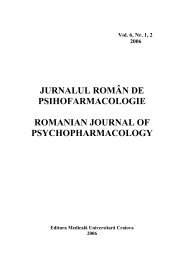jurnalul român de psihofarmacologie romanian journal of ...
jurnalul român de psihofarmacologie romanian journal of ...
jurnalul român de psihofarmacologie romanian journal of ...
Create successful ePaper yourself
Turn your PDF publications into a flip-book with our unique Google optimized e-Paper software.
IMPLICAŢII NEUROPSIHOENDOCRINE<br />
ÎN DEPRESIE – ACTUALITĂŢI<br />
G. Bă<strong>de</strong>scu, I. Udriştoiu, Oana Mihăilă<br />
Clinica Universitară <strong>de</strong> Psihiatrie Craiova<br />
Rezumat<br />
Pe lângă prezenţa simptomelor psihiatrice în suferinţele endocrine, s-a <strong>de</strong>monstrat<br />
implicarea hormonală în manifestări sau chiar boli psihice, ca şi influenţa<br />
psihologică sau psihiatrică asupra funcţionării glan<strong>de</strong>lor endocrine.<br />
Una din <strong>de</strong>scoperirile importante din psihiatria biologică a fost hiperactivitatea axei<br />
HPA la pacienţi cu tulburare <strong>de</strong>presivă majoră, corelată direct cu severitatea<br />
<strong>de</strong>presiei. S-a constatat asocierea <strong>de</strong>presiei cu un volum hipocampic redus, probabil<br />
prin atr<strong>of</strong>ia neuronală indusă <strong>de</strong> glucocorticoizi. Şi disfuncţia HPT este implicată în<br />
patogenia <strong>de</strong>presiei. Aproximativ 25 % din pacienţii cu tulburare <strong>de</strong>presivă majoră<br />
au un răspuns slab al TSH la stimularea cu TRH, apărut probabil ca urmare a<br />
interacţiunii reciproce dintre axa HPT şi sistemele <strong>de</strong> neurotransmisie, în special cel<br />
serotoninergic. Axa HPG este implicată în <strong>de</strong>presia post-partum şi simptomele<br />
<strong>de</strong>presive din perimenopauză.<br />
Implicaţiile neuroendocrine în <strong>de</strong>presie sunt multiple şi impun cercetări ulterioare<br />
pentru elucidarea lor şi <strong>de</strong>zvoltarea unor strategii terapeutice cu eficienţă superioară.<br />
Cuvinte cheie: neuropsihoendocrinologie, <strong>de</strong>presie, neurotransmiţători.<br />
NEUROPSYCHOENDOCRINE IMPLICATIONS<br />
IN DEPRESSION – REVIEW<br />
Abstract<br />
Next to the psychiatric symptoms in endocrine disor<strong>de</strong>rs, the hormonal involvement<br />
in psychiatric disor<strong>de</strong>rs and the psychological-psychiatric influence on the endocrine<br />
system have been <strong>de</strong>monstrated.<br />
One <strong>of</strong> the most important discoveries in biological psychiatry is the hyperactivity <strong>of</strong><br />
HPA axis in patients with major <strong>de</strong>pressive disor<strong>de</strong>r, proportional with the severity <strong>of</strong><br />
<strong>de</strong>pression. Depression associates a reduced hippocampal volume, probably through<br />
the corticosteroid-induced neuronal atrophy. The HPT axis dysfunction is also<br />
involved in the pathogenesis <strong>of</strong> <strong>de</strong>pression. About a quarter <strong>of</strong> the patients with major<br />
<strong>de</strong>pressive disor<strong>de</strong>r have a blunted TSH response when stimulated with TRH. This is<br />
probably a consequence <strong>of</strong> the mutual interactions between the HPT axis and the<br />
neurotransmitter pathways, particularly the serotoninic one. The HPG axis is involved<br />
in the postpartum <strong>de</strong>pression and the <strong>de</strong>pressive symptoms <strong>of</strong> perimenopause.<br />
The neuroendocrine implications in <strong>de</strong>pression are numerous, requiring further<br />
research for clarifying them and <strong>de</strong>veloping therapeutic strategies with superior<br />
efficacy.<br />
Key words: neuropsychoendocrinology, <strong>de</strong>pression, neurotransmitters.<br />
80




